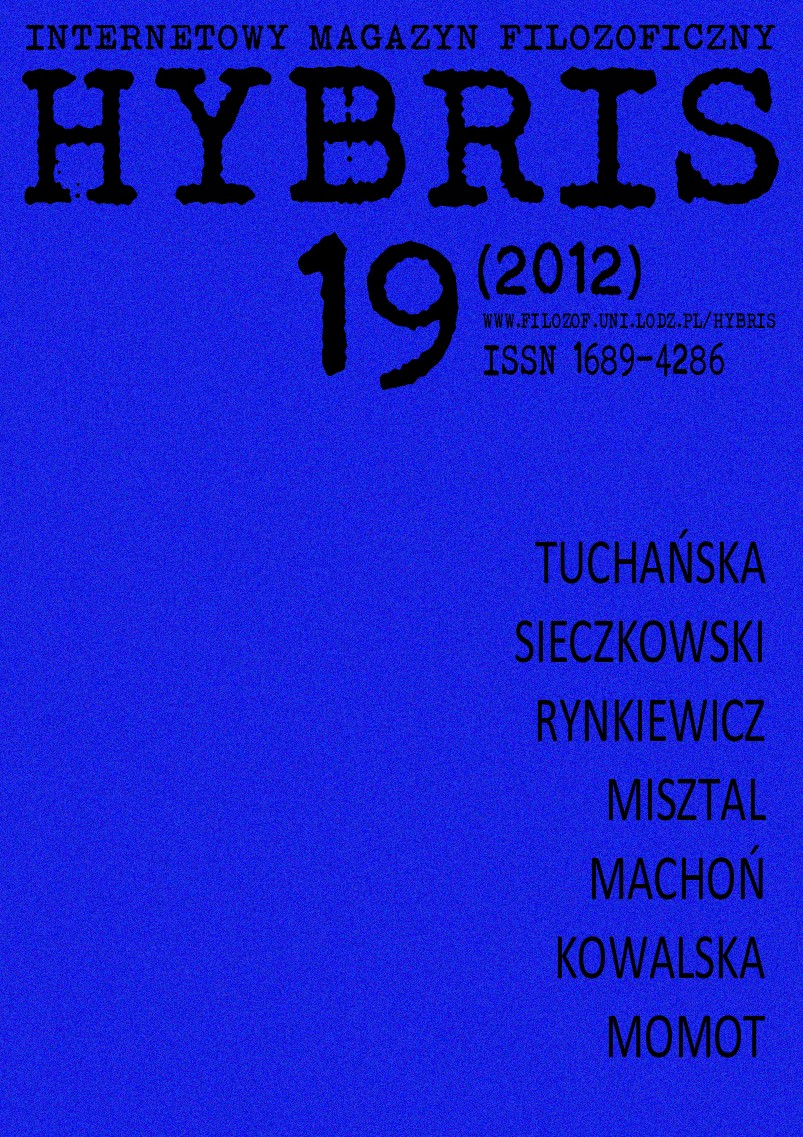A conceptual analysis of the relationship between the personal identity and the changes of the brain
DOI:
https://doi.org/10.18778/1689-4286.19.03Abstract
This essay aims to show that philosophy-hence also ethics-and neuroscience are dependent on each other. To make this visible, is to investigate the relationship between the personal identity and the changes of the brain. While the personal identity still owes its scientific resonance of philosophy, the brain is one of the entities that neuroscience is responsible to analyze in the first place. These three perspectives have to be taken into account: mereological, hermeneutic, and concrete.
References
Aristoteles (1995), Physik, übers. von Hans Günter Zekl, in: ders., Philosophische Schriften in sechs Bänden, Bd. 6, Hamburg.
View in Google Scholar
Boethius (1988), Die Theologischen Traktate (Contra Eutychen et Nestorium V), Lateinisch-deusch, Hamburg.
View in Google Scholar
DOI: https://doi.org/10.28937/978-3-7873-2577-1
Falkenburg, B. (2006), Was heißt es, determiniert zu sein? Grenzen der naturwissenschaftlichen Erklärung, in: Sturma, D. (Hrsg.), Philosophie und Neurowissenschaften, Frankfurt am Main, 43–74.
View in Google Scholar
Horn, Ch. (51997), Artikel: „Person“, in: Höffe, O. (Hrsg.), Lexikon der Ethik, München, 226–228.
View in Google Scholar
Lesniewski, S. (1916), Podstawy ogólnej teorii mnogości (dt. Die Grundlagen der allgemeinen Mengenlehre), in: Prace Polskiego Kola Naukowego w Moskwie, Sekcja matematyczno-przyrodnicza 2 (dt. Arbeiten des Polnischen Wissenschaftskreises in Moskau, Mathematisch-Naturwissenschaftliche Sektion 2), Moskau.
View in Google Scholar
Lewis, D. (1983), Survival and Identity, in: Philosophical Papers I, N.Y.—Oxford, 55–77.
View in Google Scholar
DOI: https://doi.org/10.1093/0195032047.003.0005
Lotz, J. (221996), Artikel: „Person”, in: Brugger, W. (Hrsg.), Philosophisches Wörterbuch, Freiburg—Basel—Wien, 285–287.
View in Google Scholar
Parfit, D. (1971), Personal Identity, in: Philosophical Review 80, 3–27.
View in Google Scholar
DOI: https://doi.org/10.2307/2184309
Quine, W. V. O. (1979), Identity, Ostension and Hypostasis, in: ders., Von einem logischen Standpunkt, Frankfurt am Main, 67–80.
View in Google Scholar
Rynkiewicz, K. (2008), Zwischen Realismus und Idealismus. Ingardens Überwindung des transzendentalen Idealismus Husserls, Frankfurt—Paris—Lancaster—New Brunswick.
View in Google Scholar
DOI: https://doi.org/10.1515/9783110325508
Simons, P. (1987), Parts. A Study in Ontology, Oxford.
View in Google Scholar
Rynkiewicz, K. (2011), Zur Begründung der “Kultur des Geistes”, Krakau.
View in Google Scholar
Searle, J. (2006), Geist. Eine Einführung, Frankfurt am Main.
View in Google Scholar
Tretter, F. u.a. (2010), Ist das Gehirn der Geist? Grundfragen der Neurophilosophie, Göttingen.
View in Google Scholar
Zimbardo, P. G. (1995), Psychologie, hrsg. von S. Hoppe-Graf und B. Keller, Berlin.
View in Google Scholar
DOI: https://doi.org/10.1007/978-3-662-22364-2
Downloads
Published
How to Cite
Issue
Section
License

This work is licensed under a Creative Commons Attribution-NonCommercial-NoDerivatives 4.0 International License.






